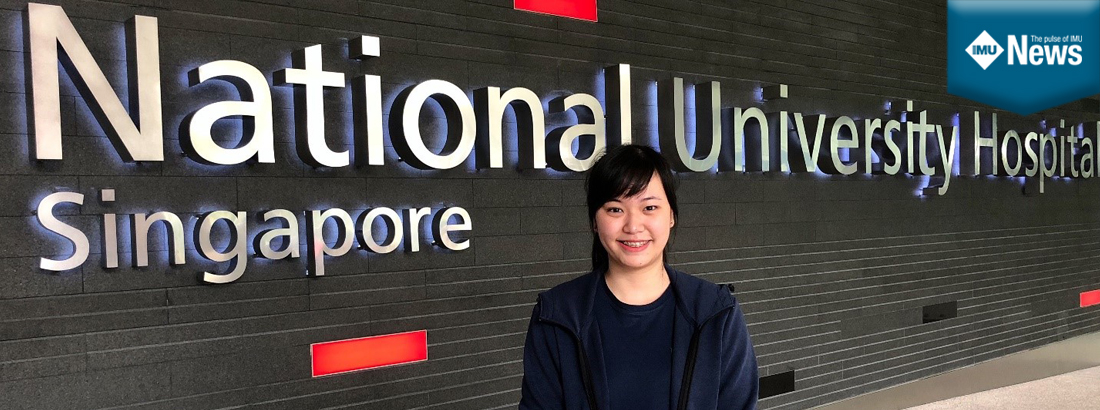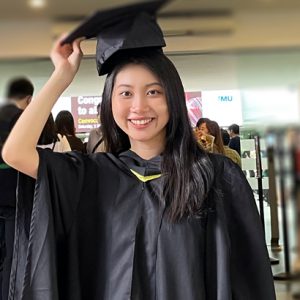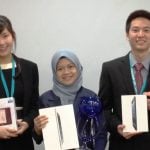On 26 February 2018, a group of third year Biomedical Science students from IMU embarked on their first internship under the module of ‘The Apprentice Phase I’. It was a 9-week industrial attachment where students may choose to have either a research-based or a diagnostic-based attachment locally in Malaysia or in other countries. I completed my 9-week internship at National University Hospital (NUH), Singapore, in the Department of Medicine, Infectious Disease Laboratory. NUH partners with Yong Loo Lin School of Medicine and has important collaborations with many leading basic research institutes such as the Institute of Molecular and Cell Biology (IMCB), Singapore Institute of Clinical Studies (SICS), Genome Institute of Singapore (GIS) and A-STAR across Singapore.
The reasons why I have chosen to do my internship here at NUH under the Department of Medicine is because its laboratory facilities are well-equipped, allowing them to enhance their research and produce quality results for the patient as well as the society. Moreover, the organisation is well recognised with more than 161 papers published in International Journals in 2006.
I was placed under supervision of Dr Louis Chai Yi Ann, who is not only an assistant professor in Department of Medicine but also a senior consultant in the Division of Infectious Disease of National University Health System. His research interests mainly focus on immunocompromised hosts, fungal infections, immunology and host pathogen interaction. My main role throughout this 2-month internship is to assist Dr Louis and his team in the project involving the analysis of immune responses by looking into different cytokines from allogeneic Haematopoietic Stem Cell Transplant (HSCT) patient samples. 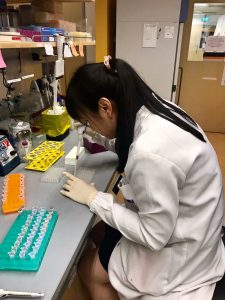 Other than that, I was given an opportunity to tag along with other research assistants and post-doctorates to learn and perform different experiments. I was warmly welcomed by Jessamine Goh, who is my trainer in the laboratory, as well as the other lab members. They took turns to guide me and explained experimental concepts to me patiently. They also took good care of me and ensured that I have achieved all my learning outcomes and fulfilled a total of 360 learning hours. Furthermore, the team members did not hesitate to correct any of my mistakes no matter how minor they were and gave me constructive feedback on my project presentation. Within the 2 months of internship, I believe I have improved my lab-based skills and gained confidence in working and handling patient samples in a research laboratory. Although my main task throughout this duration of internship was to perform Enzyme-linked Immunosorbent Assay (ELISA), I have had the opportunity to learn and perform splenocyte isolation and processing clinical specimens. I have also contributed to the team by donating blood as a control group in one of the research projects. The activities I have carried out also includes data analysis and I have actively attended lab meetings fortnightly whereby the progression of each project and financial updates were discussed. Apart from that, I have attended a safety talk entitled Seeing Eye to Eye, organised by the Department of Medicine. I truly appreciate the session as it conveys the importance of eye protection in the laboratory and proposed new safety policies to ensure the safety of the researchers.
Other than that, I was given an opportunity to tag along with other research assistants and post-doctorates to learn and perform different experiments. I was warmly welcomed by Jessamine Goh, who is my trainer in the laboratory, as well as the other lab members. They took turns to guide me and explained experimental concepts to me patiently. They also took good care of me and ensured that I have achieved all my learning outcomes and fulfilled a total of 360 learning hours. Furthermore, the team members did not hesitate to correct any of my mistakes no matter how minor they were and gave me constructive feedback on my project presentation. Within the 2 months of internship, I believe I have improved my lab-based skills and gained confidence in working and handling patient samples in a research laboratory. Although my main task throughout this duration of internship was to perform Enzyme-linked Immunosorbent Assay (ELISA), I have had the opportunity to learn and perform splenocyte isolation and processing clinical specimens. I have also contributed to the team by donating blood as a control group in one of the research projects. The activities I have carried out also includes data analysis and I have actively attended lab meetings fortnightly whereby the progression of each project and financial updates were discussed. Apart from that, I have attended a safety talk entitled Seeing Eye to Eye, organised by the Department of Medicine. I truly appreciate the session as it conveys the importance of eye protection in the laboratory and proposed new safety policies to ensure the safety of the researchers. 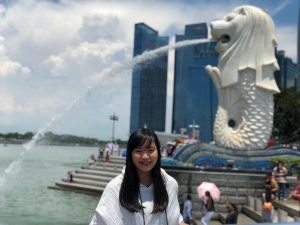
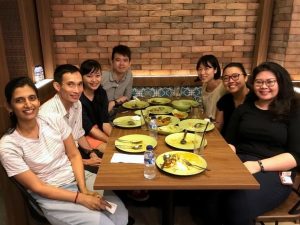 Within this short stay in Singapore, I took advantage of my time here to visit and explore Singapore every weekend. I visited the tourist hotspots – mainly the Merlion Park, Haw Par Villa, SEA Aquarium, Pahlawan Beach, Marina South Pier as well as The Maritime Experiential Museum. It was a fruitful experience as I got to explore the country and understand the history of Singapore in more detail through the museum visit.
Within this short stay in Singapore, I took advantage of my time here to visit and explore Singapore every weekend. I visited the tourist hotspots – mainly the Merlion Park, Haw Par Villa, SEA Aquarium, Pahlawan Beach, Marina South Pier as well as The Maritime Experiential Museum. It was a fruitful experience as I got to explore the country and understand the history of Singapore in more detail through the museum visit.
In conclusion, I had a wonderful experience in Singapore and I gained a lot of knowledge and skills from this internship in NUH. This experience has made me realise that working in the medical-related field will be a lifelong learning process involving constant advances in technology and techniques. One should continuously upgrade themselves to produce quality work in evidence-based research.
However, during this process, we cannot neglect teamwork, which is vital for a professional biomedical scientist to improve the efficiency in both research and diagnostic-based laboratories. Through this internship, it also builds up one’s confidence level and makes them more independent, therefore better preparing them for future challenges. As I move on to the Phase 2 internship in Semester 6 under the module of ‘The Apprentice II (Practicum)’ at Gribbles Pathology Petaling Jaya, I hope to polish up more on my lab-based skills in other aspects such as Biochemistry and Histopathology. With that, I would like to thank IMU for giving Biomedical Science students the opportunity to work in both research and diagnostic laboratories before graduating as this allows us to have an idea of the work life in both these environments so that we can better pursue our future careers with our own interest in mind.
Written by: Rachel Tong Xin Theng




